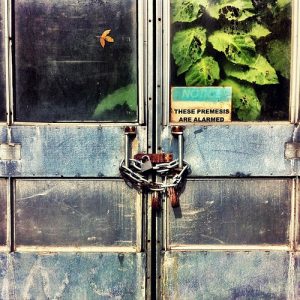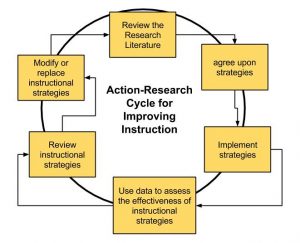
“Alarmed” by Foomandoonian is licensed under CC BY-NC-SA 2.0
Introduction
“It is a fundamental human right to have open access to literature” – John Willinsky –
Where would we be if we did not have access to the research, and literature responsible for advancing human civilization? How would we grow, and gain ground in our practices, without the guiding methodologies, and technologies, that move us forward as a society? On the 23rd of July 2019, John Willinsky spoke to our cohort. During his discourse, he told us that it was a fundamental human right to have open access to literature. In his paper, co-authored with Juan Pablo Alperin, The Academic Ethics of Open Access to Research and Scholarship, he goes on to write, “we wish to present the ethical case for going out of one’s way to ensure that one’s research and scholarship has been made as widely available as possible to other scholars around the world, as well as to interested members of the public” (pg. 218). Although it was clear, from his presentation, we have not yet succeeded in this endeavor; access to information, ideas, people, and systems are more prevalent than ever in this technologically driven era. These advances have driven us to find new ways of communication, thinking, teaching, and reflecting. However, as there is seldom betterment without strife, these advances also come with new challenges surrounding the rights, responsibilities, and ethics of use.
The System
As with most human created entities, the current system of literature access and education, is predicated around the monetary system of exchange. Given the way our society runs, it is impossible to run a school without some sort of funding model. Fortunately, at the Secondary level in British Columbia, we are predominantly funded by taxpayers, via the government. This ultimately means that we are beholden to teach what the ministry of education directs us to. With the advent of the new Curriculum in 2016, the opportunities, as well as the responsibilities of teachers has shifted. Instead of being bound to deliver an extensive amount of rote knowledge to our students, teachers now have the ability to pursue education as if people mattered.
Jeff Hopkins, the founder of The Pacific School of Innovation and Inquiry, shared his understanding of how inquiry is effectively used in a school setting, and demonstrated its use in his own school. As a practitioner of inquiry based learning I have found inquiry, used in this cross curricular manner, fascinating. A concern that has plagued me in the past, was that I was not directly teaching students enough basic skills. By listening to Jeff Hopkins speak, and interacting with a number of readings, I realize this is not only an inaccurate perception, but the potential for these students to learn, is even more possible, through cross curricular inquiry. For example, according to Teaching for Meaningful Learning, by Dr. Barron, and Dr. Darling-Hammond, a “meta-analyses of studies have found that medical students who are enrolled in a problem-based curricula score higher on clinical problem-solving measures and on actual ratings of clinical performance than peers who are not enrolled in such programs” (pg. 5). As such, if inquiry projects yield, at least, as much learning as the other models of education, this shift in education, should indeed be conducted. Furthermore, this shift should also encompass multiple classrooms, in multiple areas of learning.
Methodologies
Within this system, we have the ability to gain insight into a number of research methodologies, to reflect upon, and improve our practice. Within these methodologies, it is not enough to simply reflect upon what we are doing, but we must engage in an effective framework, which quantifies and/or qualifies our practice, as the teacher-researcher. I found the correlation between qualitative and quantitative methods most effectively broken down by Alicia O’Cathain, in Assessing the Quality of Mixed Methods Research: Towards a Comprehensive Framework. Mixed methodology, in research, allows the teacher-researcher to play on the strengths of both quantitative research, and qualitative research. As quantitative research alone, does not take into account personal experience, I find O’Cathain’s argument for a mixed method, quite compelling. After determining which data acquisition framework to use, it is important to look at which research methodology to employ. As fond as I am of the various types of ethnographies, the methodology that sparked my greatest interest was Action Research, as proposed by Mary McAteer in Getting to Grips with Perspectives and Models In: Action Research in Education.
Action Research, is essentially a process for improving one’s own teaching practice. This process is outlined in the diagram below, and a more complete explanation of it can be found in an earlier blog of mine located, here.

“Action Research Cycle for improving instruction” by w.robkoch is licensed under CC BY-SA 2.0
At the heart of Action Research, is the reflection that takes place during, and after, delivering a lesson to a group of students. I feel as though, for all of the years I have been teaching, I have been engaging in an informal version of Action Research. To finally read and reflect on a methodology that frames, and defines, my practice is very fulfilling. I also, however, now feel that I have not been doing enough. McAteer writes “Action research, on the other hand, is the product of planned deliberation, of systematic data collection, collation and analysis, of theory testing and theory generation, and adheres to some agreed principles” (pg. 4). In order to meet the rigorous demands of this methodology, I need to commit to doing more; documentation on my lessons, and reflecting upon them, will help me meet this goal. After thinking about this, another article came to mind, Research Diary: A Tool for Scaffolding. In this article, Marion Engin, tells us that, “writers develop and learn during the research process, and become the expert other as their research experience evolves” (pg. 298). As I feel, I already excel at talking to myself, this is a natural evolution for me to pursue, as I attempt to improve my teaching practice this fall.
Modern Tools in a Modern World: The Use and Responsibilities
Another method of overcoming the barriers, that our monetary system of constraints to access have placed on us, is the use of technology, and social media, for networking and scholarship. Interactive platforms such as: Twitter, Hootsuite, Facebook, Hypothesis, Trello, and slack, provide us with virtually unlimited access to scholars, instructors, peers, family, and friends, that allows us to network and interact like never before. As discussed in a previous reflection, I began my journey into social media very apprehensively, but as I began to interact more and more with the various forms of social media, I have, ultimately, began to see the massive positive impact it can have.
In fact, reflecting upon Twitter Use and its Effects on Student Perception of Instructor Credibility, by DeGroot, Young, and VanSlette, I have noted that social media, may, increase student-teacher relationships, if used correctly. Despite wanted to apply this to my own practice I, however, feel apprehensive utilizing these forms of communication with my class due to British Columbia’s FOIPOP legislation. Finally, the act of using these social media platforms also comes with a cost. All information put forth, or engaged in, becomes very public, forever. This places a substantial onus on the learner to use social media correctly. It is wise for those engaging in such platforms to remember a quote from In Public: The Shifting Consequences of Twitter Scholarship, by Bonnie Stewart, which she wrote as she was reflecting on a New York Times article: “One stupid tweet can ruin your life… and open you to pillory and career carnage” (pg. 6).
Conclusion
Overall, our modern, connected, and technologically advanced world has enabled us to interact with each-other, and an enormous amount of information, in a way never before possible. Despite living in a system of monetary propriety, that tries to limit our access to research; technology itself is providing a solution to circumvent this. Between Social Networking, open access documents, and even people like Alexandra Elbakyan, who created the hacked, open access website Sci-Hub, (and is now known as the modern day, Robin Hood of Science) have brought us together, like never before. Ultimately, as an educator, the onus is now on me to take this knowledge, and integrate it into my practice, to continue the advancement of education.
Recent Comments